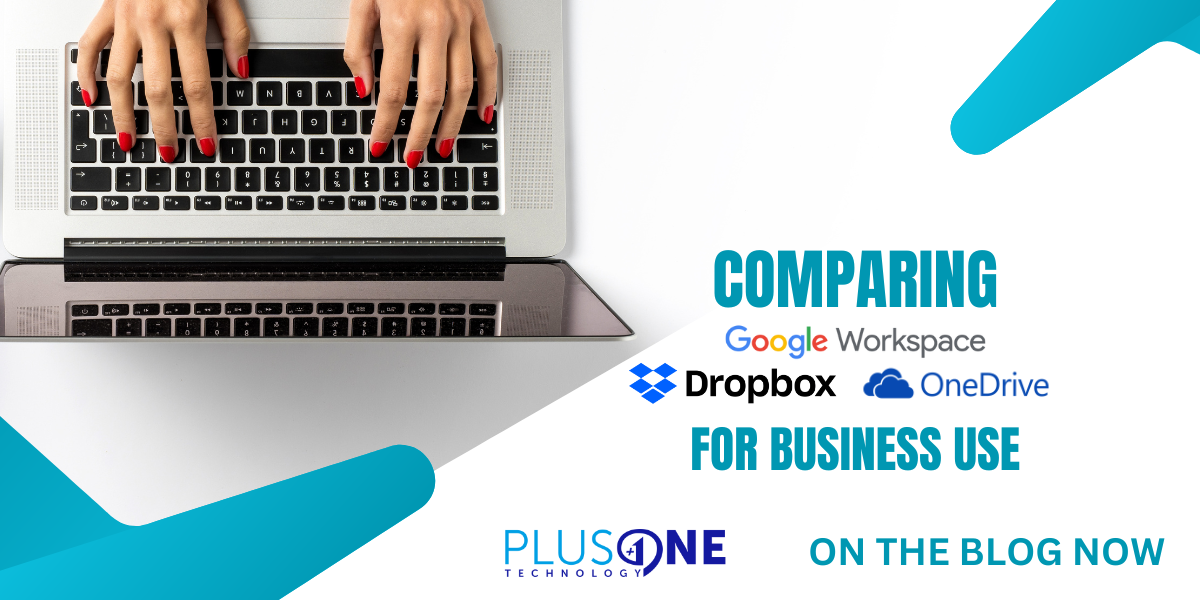In the realm of cloud storage solutions for businesses, three names stand out prominently: OneDrive, Dropbox, and Google Workspace. Each of these platforms offers unique features tailored to enhance productivity, collaboration, and data security. In this blog post, we’ll dive deep into comparing these three solutions across key parameters such as ease of use, cost, security, and compliance.
Ease of Use
OneDrive: OneDrive integrates seamlessly with Microsoft’s suite of applications, providing a familiar interface for those already using Office 365. The intuitive design allows for easy navigation, file sharing, and collaboration within the Microsoft ecosystem.
Dropbox: Dropbox is renowned for its user-friendly interface and straightforward functionality. Its drag-and-drop feature, combined with a clean and minimalistic design, makes it accessible even for non-tech savvy users. Integration with various third-party apps further enhances its usability.
Google Workspace: Google Workspace offers a cohesive experience through its suite of productivity tools such as Google Drive, Docs, Sheets, and Slides. The interface is clean and consistent across all applications, making it easy for users to switch between tasks and collaborate in real-time.
Cost
OneDrive: OneDrive for Business comes bundled with Microsoft 365 subscriptions. Prices range from $5 per user/month for the basic plan to $22 per user/month for the premium plan, which includes advanced security features and Office apps.
Dropbox: Dropbox Business pricing starts at $15 per user/month for the Standard plan, which includes 5 TB of storage. The Advanced plan costs $25 per user/month and offers unlimited storage with additional administrative and security features.
Google Workspace: Google Workspace pricing is competitive, starting at $6 per user/month for the Business Starter plan, which includes 30 GB of cloud storage. The Business Standard plan costs $12 per user/month and offers 2 TB of cloud storage, while the Business Plus plan is $18 per user/month with 5 TB of storage.
Security
OneDrive: OneDrive offers robust security features, including data encryption in transit and at rest, advanced threat protection, and multi-factor authentication. It also provides detailed audit logs and compliance with industry standards such as ISO/IEC 27001, GPDR, HIPAA, FTC Safeguards, and more.
Dropbox: Dropbox employs strong encryption methods and offers two-step verification, sharing permissions, and remote device wipe capabilities. Additionally, its Dropbox Business plans include extensive security features like single sign-on (SSO) and comprehensive activity tracking.
Google Workspace: Google Workspace ensures data security with encryption at rest and in transit, advanced phishing and malware protection, and multi-factor authentication. It complies with major industry standards, including GDPR, HIPAA, and ISO/IEC 27018.
Compliance
OneDrive: OneDrive meets various compliance standards, including GDPR, HIPAA, FTC Safeguards and FedRAMP. It offers tools for eDiscovery, legal hold, and Data Loss Prevention (DLP), which are essential for organizations handling sensitive data.
Dropbox: Dropbox is compliant with several important standards such as GDPR, HIPAA, and SOC 2. Its compliance certifications and features like file recovery and version history ensure that businesses can meet regulatory requirements with ease.
Google Workspace: Google Workspace is known for its strong compliance framework, supporting GDPR, HIPAA, and various ISO standards. It also provides extensive admin controls, audit reports, and data regions, allowing businesses to manage data residency and compliance efficiently.
Collaboration and Integration
- OneDrive:
- Best suited for users heavily invested in the Microsoft ecosystem (Windows, Office 365, Teams).
- Supports real-time co-authoring in Office apps.
- Dropbox:
- Excellent for sharing files across different platforms.
- Integrates with tools like Slack, Zoom, and Trello for business users.
- Dropbox Paper offers basic collaboration tools, but it’s not as strong as Google Docs or Microsoft Office for real-time editing.
- Google Workspace:
- Provides seamless real-time collaboration via Google Docs, Sheets, and Slides.
- Strong integration with Gmail, Calendar, Meet, and other Google services makes it great for teams.
Usability
- OneDrive:
- Easy to use for anyone familiar with Microsoft Office.
- Best for Windows and Office-centric users.
- Dropbox:
- Simplified, user-friendly interface with minimal learning curve.
- Syncing is often faster and more reliable than competitors.
- Google Workspace:
- Simple, web-based interface.
- Optimized for browser-based work, making it ideal for those who work extensively with Google Docs and web apps.
Feature Comparison Table
| Feature | OneDrive | Dropbox | Google Workspace |
| Ease of Use | Seamless integration with Microsoft apps | User-friendly, drag-and-drop, third-party app integration | Cohesive experience with Google productivity tools |
| Cost | $5-$20/user/month | $15-$25/user/month | $6-$18/user/month |
| Security | Encryption, advanced threat protection, MFA | Encryption, two-step verification, SSO | Encryption, phishing protection, MFA |
| Compliance | GDPR, HIPAA, FedRAMP | GDPR, HIPAA, SOC 2 | GDPR, HIPAA, various ISO standards |
| Storage | 1 TB – unlimited (with Microsoft 365) | 5 TB – unlimited | 30 GB – 5 TB |
In conclusion, choosing between OneDrive, Dropbox, and Google Workspace depends on your business’s specific needs. OneDrive and Sharepoint are great for businesses with security and compliance concerns. Dropbox is the solution usually selected for those with a need to sync files cross platform such as Mac and Windows. Google Workspace is great for those deeply engrained in the Google environment.
Evaluate your requirements and budget to make an informed decision that aligns with your business goals.







